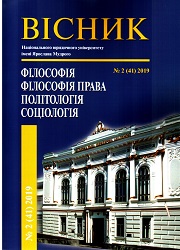КРИЗА ДЕМОКРАТІЇ І СКЛАДНОЩІ ЛІБЕРАЛІЗМУ: ПРИЧИНИ ВИНИКНЕННЯ, МЕХАНІЗМИ ТА ПЕРСПЕКТИВИ РОЗВИТКУ
THE CRISIS OF DEMOCRACY AND THE DIFFICULTY OF THE WAYS OF LIBERALISM: THE CAUSES, MECHANISMS AND PROSPECTS
FOR DEVELOPMENT
Author(s): Barabash Oleh VasylovychSubject(s): Civil Society, International relations/trade, Political behavior, Politics and society, Social Theory, Sociology of Culture, Sociology of Politics, Geopolitics
Published by: Національний юридичний університет імені Ярослава Мудрого
Keywords: crisis of democracy; liberalism; populism; political regimes; transit; liberal hegemony; geopolitics, critical joints;
Summary/Abstract: Problem setting. In our opinion, the current crisis of democracy should be investigated in the broad context of the mutual influence of democracy and liberalism, the growth of populist tendencies in the world, the strengthening of authoritarianism, the crisis of liberal institutionalism and the complexity of the draft international law, and in connection with the sum of geopolitical factors.Recent research and publications analysis. The scientific literature discusses widely the problems of the modern crisis of democracy. They are at the center of attention ofwell- known scholars (Irina Denisenko, Mykhailo Trebin, Ihor Polishchuk, Halyna Kuts, Victoria Pohribna, Olena Sakhan, Chantal Mouffe, Steven Levitsky, Lukan A. Way, Jan Zielonka, Larry Diamond, Daniel Ziblatt, Jordan Kyle, Yascha Mounk, Limor Gultchin, Nadia Urbinati).Paper objective. The purpose of this work is to find out where in the modern world the differences between liberalism and democracy begin. The task is to reach understanding of the threats and possible positive aspects of the affirmation of populism, to point out the places and meaningful centers of critical joins, manifestations or “breakthroughs” of perspectives on political processes, values-orientation shifts, institutional changes.Paper main body. The article attempts to study the modern crisis of democracy in a diverse sense, in the broad context of the mutual influence of democracy and liberalism. The problem of growth of populist movements of various character in the world, their meaningful expression, influence on the transformation of democracy, threats to the combination of democracy and liberalism is analyzed. There are tendencies of increasing authoritarianism, deepening the crisis of the liberal model of institutionalism and the whole draft international law. The separate statistical data of international organizations concerning the degree and forms of distribution of populism have been researched, various scientific approaches concerning variants of further development of populist scenarios under conditions of newest geopolitical changes and strategic interests transformations are considered. An attempt was made to designate places and centers for the content of manifestations or critical moments, “breakthroughs” in prospects for political processes, changes in value orientations, institutional changes. to find the best ways and resources for further development. Attention is drawn to the fact that the crisis of democracy arose on the verge of links between the content of liberalism (with its uncertainty about the collective identity of the past and present) and democracy as a process of tolerance to the plurality of interests and opportunities for their legal representation and advocacy. It was emphasized that a change in the development tendency may occur depending on many factors, including readiness for the consolidated solutions of the elites of the modern world to overcome all threats and find a balance of national-state and world-scale. interests. It is emphasized that the nature of the resolution of the conflict in Venezuela may have an important precedent that will lead to a quick and qualitative change, which can also create a certain trajectory for the future development of political processes at various levels. It is also noted that one of the centers of concentration trends is the situation with the final decision of the UK on membership in the European Union.Conclusions of the research. In our opinion, the change in the development trend (on monovectorality, the universality of the path, etc., the issue even is not discussed) can occur depending on many factors, including the readiness for the consolidated solutions of the elites of the modern world to overcome all threats and find ways to balance the aggregate interests between levels of national-state character and world scale. An important position in designating the prospect is how the situation in Venezuela will end: what will be meaningful and in what style - ruptura pactada or armed conflict - may be a meaningful breakthrough of perspective which will mark orientations in the formation of tendencies. But, perhaps, this situation development, by the law of large numbers, will bring chaos to a level absurd with further non-obvious solutions and conflicting scenarios. One way or another, the solution to the conflict of interest in Venezuela and the solution to the issue of Brexit will be followed by a quick qualitative change, which may also set a certain trajectory for future shifts in political processes at different levels.
Journal: Вісник НЮУ імені Ярослава Мудрого. Серія: Філософія, філософія права, політологія, соціологія
- Issue Year: 41/2019
- Issue No: 2
- Page Range: 103-117
- Page Count: 15
- Language: Ukrainian

